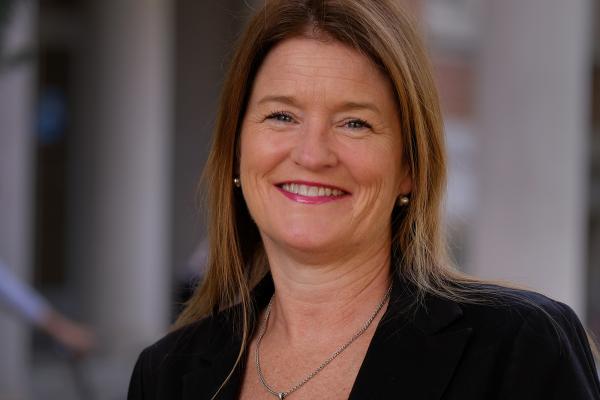
FPG Faculty Fellow profile: Dorothy Espelage
October is National Bullying Prevention Month and October 6 is the World Day of Bullying Prevention. And so, we are re-featuring a story from our faculty fellow profile series, which spotlights the work of FPG Faculty Fellow Dorothy Espelage, a leading expert on addressing teenage domestic violence, bullying, and student well-being.
This story was originally published on September 12, 2023.
The research and translation of empirical findings of UNC Frank Porter Graham Child Development Institute (FPG) Faculty Fellow Dorothy Espelage, PhD—a leading expert on addressing teenage domestic violence, bullying, and student well-being—have resulted in a plethora of interventions, policies and laws protecting young people and making schools safer. On October 25 – 27, Espelage, William C. Friday Distinguished Professor of Education at the UNC School of Education, is hosting—along with UNC—the 2023 World Anti-Bullying Forum, a biennial convening for international scholars, practitioners, and policymakers focused on understanding and ending bullying among young people. (See sidebar.)
While Espelage’s doctoral dissertation at Indiana University examined a behavioral assessment of eating disorders, during graduate school she served as an evaluator examining the effectiveness of a computer program to prevent youth violence among middle school students. Although the randomized control trial found that the intervention reduced physical fighting, it did not impact what Espelage describes as subtle bullying. In reading the literature on bullying during this project in the early 1990s, she discovered the work of Dan Olweus, a Norwegian psychology researcher focused on bullying. But Espelage was not convinced that Olweus’s work translated to the kids she was studying in the Midwest. This led to her conducting focus groups and interviews with young people to understand bullying: Why do children bully? What can prevent it? What are the risk factors and protective factors?
She became interested in a social network analysis of bullying—how bullying could be used as a way to establish hierarchy—with one of her early findings being that bullies are often popular and likeable. Espelage says that many of her theoretical ideas came from her experience as a military brat who moved 12 times during her youth, noting that she sought out the popular students in each school as friends as a protective device.
Over the nearly 30 years that Espelage has studied bullying, her work has evolved along with the culture. Cyberbullying has become part of her research as have investigations on how bullying affects students with disabilities, gender and sexual minorities, immigrant populations, minoritized race and ethnic groups, and other marginalized individuals.
She notes that bullying is harmful, not just to those who are targeted but to perpetrators and bystanders as well. With one out of five North Carolina students in seventh through 12th grade and one out of two LGBTQ+ students in the state attempting suicide in the last year, anti-bullying efforts can literally be life or death. Espelage stresses the importance of doing upstream prevention to create a positive school climate so that when students engage with one another—in person or on social media—they are more likely to be pro-social.
She and her colleagues have moved the needle on bullying through social-emotional learning programs in which young people learn how to manage conflicts without aggression or bullying, understand how others think, and understand diversity. Recognizing the importance of implementation science, Espelage and her team spend time analyzing implementation data. Her current projects include alpha testing Bully Down, a nine-week social-emotional learning text messaging program for middle school kids, whose content was developed with students. The pilot in Chatham County, funded by the National Institute of Child Health and Human Development, will include several messages a day to participating students, designed to provide emotional support. In a National Institutes of Justice funded project, Espelage is conducting a meta-analysis examining longitudinal data on impulsivity and emotion regulation as predictors of school violence.
Another meta-analysis project is using participatory research to determine the extent to which social-emotional learning programs that have largely been developed with white children work for students of color. She is creating an intervention using peer leaders with high school students to get them to stop vaping. Together with her students, Espelage is collaborating on an NIH-funded integrated data analysis project to explore whether school-based programs reduce suicide for LGBTQ+ students. In addition, she is working on a pro bono project across the State of North Carolina, in conjunction with the UNC Suicide Prevention Institute, leading a suicide prevention trial in 11 schools in North Carolina based on her work in a prior large-scale evaluation of the suicide prevention program in 20 schools in Colorado.
Her interdisciplinary and diverse research interests and strong respect for the work of the Institute inspired Espelage to become an FPG Faculty Fellow. She values FPG’s multidisciplinary focus as well as its expertise in prevention science and implementation science. She says that the webinar series, speaker series, and conversations with FPG colleagues have sparked grant proposal ideas and helped her create connections in the community, after arriving at UNC in 2019. “People in social work, public health, education, and other disciplines talk to one another at FPG and don’t just stick to their own discipline, which I really appreciate,” she says.
